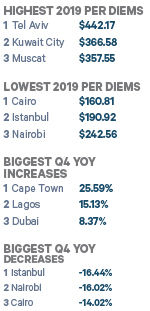
Across Middle East and African countries included in BTN's Corporate Travel Index, economic growth generally has been slow and steady, but business travel costs show more volatility. Political scenarios play a big role, but stability does not yield immediate returns. Improving infrastructure is slow work, and flare-ups of violence, as seen in Istanbul and Cairo, can drag down growth. Still, new and improved airports, hotels, and destination services are dotting the region, led by Dubai's scale-up for World Expo 2020.
Middle East
The region's highest per diem is in Tel Aviv, which commands by far the highest hotel cost and also ranks relatively high in meals and transportation. Lodging bargains are hard to come by in Israel's business hub, where the average daily rate for corporate-booked upscale properties exceeded $230 in Q4 2019, above or comparable to rates for luxury hotels in most other cities across the Middle East and Africa.
In the Middle East, the 2018 opening of Istanbul's massive new airport is shaking up human flow patterns and competitive dynamics. Expected to have capacity for 200 million annual passengers upon full completion in 2025, Istanbul Airport will challenge Dubai, Doha and Abu Dhabi as hubs connecting the U.S. and Europe to Africa and Asia. But so far, Turkey's new status as an air traffic leader has not had much impact on cost; Istanbul's year-over-year Q4 per diem was down 16 percent from 2018 to 2019.
Dubai is among the pricier cities in the region, and it experienced a healthy 8 percent year-over-year per diem uptick in for Q4 2019. The next couple of years will bring more cost fluctuation as the city hosts the World Expo from October 2020 through April 2021. Host cities typically experience rate softness as new hotel inventory is added in preparation, followed by sharp increases during the event, and post-event decline for months or years as demand catches up with the supply boom. How closely Dubai follows this pattern is in question. "Both rent and purchasing property prices are going down, even with Expo coming up," said Francisco Nunez, vice president of CWT's global partners network. He expects weak pricing for a few years after the Expo.
Saudi Arabia's Vision 2030 plan seeks to move the country away from economic dependency on oil. Travel and tourism efforts are aimed primarily at attracting more leisure visitors, but increased hotel inventory is depressing room rates, which were down about 5 percent from Q4 2018 to Q4 2019.
Cairo is finding its footing slowly as Egypt emerges from years of political and economic tumult. The government has been supportive of tourism growth in its Cairo Vision 2050 plan, improving the city's hotel stock and expanding its airport. One of the lowest-cost cities in the region, Cairo's per diem declined in 2019, but observers are optimistic. "Cairo is undergoing a city transformation, but there is a lot to do," said Nunez.
Africa
Johannesburg is among the most significant business travel cities in South Africa. Its year-over-year Q4 per diem cost dipped 11 percent in 2019, despite a negligible shift in room or meal costs. Rather, the decline was led by a big drop in ground transport costs in the last quarter, possibly due to the growth of Uber in South Africa, and customer acquisition skirmishes with Estonia-based ride hailing app Bolt. Cape Town, one of the safer and more affordable cities in the region, experienced a 26 percent increase in per diem in Q4 2019, driven largely by hotel rates.
Kenya's capital city, Nairobi, joined Istanbul in the dubious distinction of a significant per diem decline, led by a 23 percent drop in room rates. According to CWT's Nunez, oversupply is to blame. "It's very interesting to see how some international chains continue to invest," he said. Among the recent openings: a 365-room JW Marriott set to open in 2020.
Nigeria's business hub welcomed the opposite trend in 2019: Lagos experienced a hotel-driven bump of 15 percent from Q4 2018 to Q4 2019. Limited available supply in a city with significant safety concerns is one reason.
Risk Ratings
Despite improved political stability, Cairo is one of the most dangerous cities in the Corporate Travel Index Riyadh, Nairobi, Lagos and Johannesburg and Istanbul all had risk scores well above average, and Cairo and Johannesburg each had very high rates of physical violence, theft and inappropriate behavior toward women. Across the region, the biggest risk factors are political volatility and LGBTQ+ discrimination. On the latter measure, destinations across the region have some of the worst situations globally, according to GeoSure's risk scale. Muscat and Tel Aviv are the safest indexed cities within the Middle East and Africa; the safest in Africa is Cape Town.